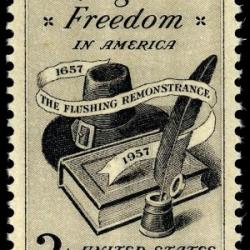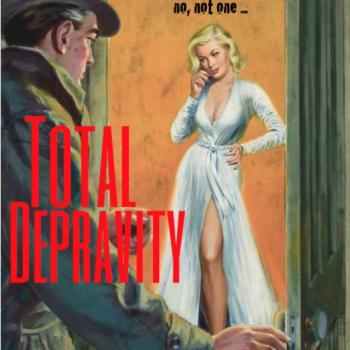Three years ago today it poured rain in Sea Isle City, N.J.
It was a torrential thunderstorm that ruled out any plans for a wedding on the beach. That downpour also coincided with high tide, producing flooding that lingered long after the rain finally stopped. Two feet of water covered the streets in the middle of town — including in front of the rented beach house on the porch of which we’d hastily relocated our ceremony.
 But at least the rain had stopped by then, so I was able to carry my bride-to-be across the knee-deep street without getting the rest of us soaked. Made for some memorable wedding photos.
But at least the rain had stopped by then, so I was able to carry my bride-to-be across the knee-deep street without getting the rest of us soaked. Made for some memorable wedding photos.
Plus, wedding vows are essentially a pledge to stick together and love one another come hell or high water, and it was nice to be able to check one of those off the list right there at the start.
While the weather prevented us from having our wedding ceremony on the beach there were other factors that prevented us from having it in a few other places.
The slacktivixen was raised in the Catholic Church, but our getting married in a Catholic church wasn’t an option. The church would say that we were forbidden to have a Catholic wedding because she’s a divorced ex-Catholic who was marrying a divorced Protestant. (She would say, rather, that due to the way that she was treated by the Catholic Church back when she was going through that divorce, they are forbidden to be involved in any future happy or sacred events in her life.)
It’s not just divorced people who are forbidden to marry in the Catholic Church, of course. It’s also Presbyterians, Methodists, Baptists, Pentecostals, Hindus, Jews, Muslims, Mormons, Pagans and anyone else who isn’t a Roman Catholic in good standing. That’s not an unjust discrimination on their part, it’s just how their church works. They don’t consecrate all weddings, just Catholic ones. And the parameters for what “Catholic” means there is, reasonably, something that it’s best left to Catholics to decide.
This is true of most sectarian wedding ceremonies. The ‘vixen and I could not have gotten married in a synagogue or a Hindu temple or a Jehovah’s Witness Kingdom Hall either because we are not Jewish or Hindu or Jehovah’s Witness. That makes sense and, again, it is in no way a form of unjust discrimination. We’ve attended Jewish weddings and were warmly welcomed and included in those joyous celebrations, but it would have been weirdly inappropriate for us to have tried to have one for ourselves, to have our wedding consecrated in a tradition to which we do not belong. (I haven’t yet been to a Hindu wedding, but I hope I get to go to one some day. They look awesome.)
It would be very different if the Roman Catholic Church had a monopoly on civil marriage in New Jersey — if the only way to get married legally there were to have the ceremony consecrated by a Catholic priest in a Catholic church according to Catholic rules. Then we would have been facing a real and serious form of unjust discrimination. We would have had a legitimate civil rights complaint — as would every other divorced, Protestant, ex-Catholic, Jewish, Hindu, atheist or otherwise non-Catholic couple seeking to marry in the Garden State.
But the only monopoly on legal marriage in Sea Isle City is held by city hall and city hall does not discriminate on sectarian grounds. When we went to city hall to get our marriage license, they didn’t care what sect we belonged to or if we were members in good standing or if we even belonged to any sect at all. As far as they were concerned, we were free to have whatever additional religious ceremony or ceremonies that we wanted. We could have our marriage consecrated by any sect or by no sect at all. That didn’t matter. Consecration was none of their business and they didn’t want it to be any of their business. No such religious ceremony would have any bearing on our legal status as a legally married couple, and what Trenton hath joined together no priest or bishop can put asunder.
My point here is that me being a Protestant, or a divorced Protestant, and my wife being a divorced ex-Catholic had no bearing and in no way restricted our ability to get legally married down the shore. The state of New Jersey had only a short list of stipulations and none of those had anything to do with religion: 1. We had to both be adults; 2. We had to show that neither of us was already legally married to someone else; 3. We had to show that we were not close blood relatives; and 4. We had to be members of opposite genders.
Those first three rules seem reasonable to me, but I do not see any legal basis for the fourth. The state of New Jersey has a monopoly on the legal recognition of marriage and it has chosen to exclude some couples arbitrarily. That is a real and serious form of unjust discrimination. That is a violation of civil rights. And it’s not logically or legally any different than if New Jersey were to decide to refuse marriage licenses to non-Catholics or to non-Baptists or to Capricorns or redheads.
One of the main reasons that this unjust discrimination persists — in New Jersey and in more than 40 other states in America — is due to the alleged concern of religious groups that if same-sex couples are no longer denied their right to get married, then somehow their churches will be legally compelled to consecrate the marriages of any same-sex couple that walks in off the street.
If you’ve been paying attention, you’ll realize that we’ve already shown this argument to be bogus. You’ll realize, in fact, that we’ve already shown that these religious groups ought to know that this argument is bogus. Divorced people have the legal right to marry in New Jersey, but Catholic churches in New Jersey are not legally compelled to consecrate their marriages. They are free to refuse to perform such ceremonies and they do, in fact and as a matter of course, refuse to perform such ceremonies all the time. They know this.
Everyone knows this. It’s not particularly confusing and yet, somehow, the public debate over same-sex marriage seems to be hopelessly confused on this very point.
Anyway, my anniversary today is a reminder of my happiness. And as such it is also a reminder for me of how cruel and capricious and fundamentally unfair it is that we continue to deny some couples their chance for such happiness.












